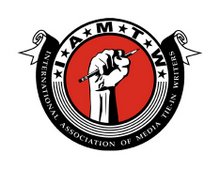I'm thrilled and extremely proud to announce that my friend and colleague, Writer Beware co-founder and Chair Ann C. Crispin, has been named the 2013 Grandmaster by the International Association of Media Tie-In Writers (IAMTW).
The official announcement is here.
This annual honor, the highest awarded by the IAMTW, is given only to the most accomplished and successful authors in the field (previous Grandmasters include Kevin J. Anderson, Peter David, and Keith DeCandido). Ann's outstanding media tie-in achievements include best-selling novels in numerous franchises, including Star Trek (Yesterday's Son and Sarek, among others), Star Wars (the best-selling Han Solo trilogy), V (the original novelization), and Pirates of the Caribbean (The Price of Freedom).
Ann works in her own worlds as well. She created the acclaimed StarBridge series for young adults (recently brought back into circulation in electronic form), and, for adults, the high fantasy novel Storms of Destiny. She's also a respected writing teacher and workshop leader, many of whose students have gone on to be professionally published--and, of course, a founding member of Writer Beware, where she is a force to be reckoned with (just ask Martha Ivery).
On a personal note...Ann and I began as colleagues, united by our concern about the many scams that victimize writers. But our professional relationship quickly ripened into a close and deep friendship. We're not just fellow warriors in the battle against literary fraud, we're companions, confidantes, and trusted beta readers.We've shared so much over the fifteen years since Writer Beware's founding (holy crap--fifteen years!!), both good and bad, and we know each other inside out. That may sound corny...well, yes, it does sound corny. But it's the truth. I can't possibly be as thrilled as Ann that her accomplishments are being honored in this way--but I'm pretty chuffed!
Many people regard media tie-in writing as the red-headed stepchild of publishing. Not writing in your own universe--that's hackwork! A copout for those too unoriginal to make up their own stories! A half-step up from plagiarism! But having been Ann's beta reader through the entire process of creating The Price of Freedom, I can tell you that tie-in writing is a lot more difficult than most people think. It's challenging, exacting, and requires an incredible degree of discipline. Not everyone is capable of doing it.
Ann addresses this issue in her response to the award.
To be honest, for years I struggled with the prevailing attitude among some s.f. and fantasy writers that writing media tie-ins was the ultimate in degrading hackwork, lower on the authorial totem pole even than writing pornography to eke out a living.Please join me and Writer Beware in congratulating a wonderful storyteller, caring mentor, fearless activist, and loyal friend: Ann Crispin.
Personally, I believe a good story is a good story, no matter what universe it’s written in. I really love being able to put characters from famous universes through their paces, and get inside their heads. I put as much effort into my tie-in books as I do for my original books (though I confess the original books are tougher to write, since you have to make it ALL up), and I was proud of the stories I produced. But I didn’t like getting openly snubbed or patronized sometimes when I was at conventions or writer gatherings.
One time I was talking to my dear friend, Andre Norton, about how I felt about this, and she set me straight. “Ann, you are a STORYTELLER,” she said. “One of the oldest and proudest professions known to the human race. No matter what kind of story you’re telling, be proud of that ability!”
Fortunately, that snotty attitude among the “purist” s.f. and fantasy writers seems much less prevalent today. Earning a living writing is so darned tough these days that whatever type of writing you’re doing, if you can make money doing it, hey, more power to you.
So I’m very proud to be receiving this award, and proud to be a storyteller.
For more info on Ann and her many novels, visit her at her website.


